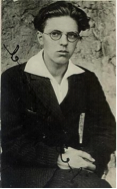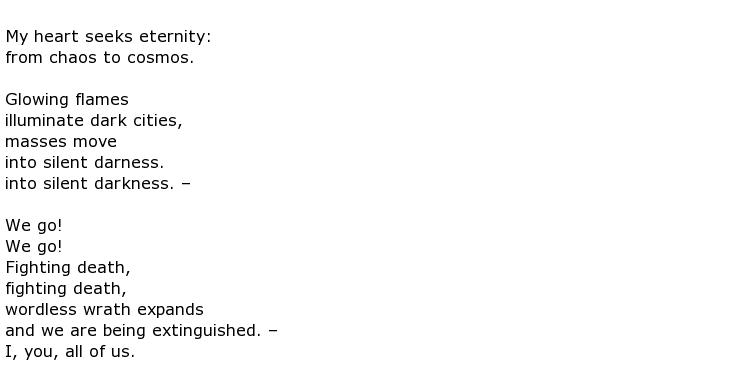 Srecko Kosovel was a Slovenian poet of the early 20th century who held strong political views regarding the enforced annexation of his country by neighbouring Italy. He led a tragically short life, succumbing to illness at the age of 22. However, in his short time as a writer, he secured a reputation as an expressionist and satirical poet, and an advocate of Dadaism.
Srecko Kosovel was a Slovenian poet of the early 20th century who held strong political views regarding the enforced annexation of his country by neighbouring Italy. He led a tragically short life, succumbing to illness at the age of 22. However, in his short time as a writer, he secured a reputation as an expressionist and satirical poet, and an advocate of Dadaism.
He was born on the 18th March 1904 in Sežana, which was part of the Austro-Hungarian Empire at that time. He lived almost all of his life in a nearby village called Tomaj. His father was a teacher who suffered at the hands of the authorities in that he could not teach in his native language after the Treaty of Rapallo in 1920. His mother bore five children and was keen to nurture their artistic talents which included writing and piano playing.
Kosovel grew up with a keen awareness of his country’s cultural heritage despite attempts by the Fascist regime to quell all of this. He soon became the “voice of international socialism” with an impressive body of work to his name considering he had such a short life. Critics have praised the quality of his poems, numbering at least 500. Due to the political difficulties of the early 20th century it took some forty years for most of his work to be published.
Before annexation in 1920 he was able to enjoy drama productions at the Slovene Theatre in Trieste as well as studying literature written by his countrymen, thus developing his hunger to produce his own work in a similar vein. Some have compared him to the Frenchman Arthur Rimbaud, and both young men were noted for the surrealism in their work. Kosovel was certainly influenced by his proximity to the Isonzo Front, a scene of great suffering for both military personnel and civilians during the early years of the First World War. It was a traumatic experience for a sensitive teenager and his parents moved him away from the area in 1916. Both he and his sister were sent to live in Ljubljana.
Naturally he missed the rest of his family and some of his early work was about this longing for them as well as the landscapes of his homeland. He joined other exiled Slovenes at the University of Ljubljana in creating a literary magazine called Lepa Vida, an expression that translates as The Fair Vida and comes from an old Slovene folk poem. His longing for what he had left behind soon turned to more radical and avant-garde thoughts of revolution and the repossession of his country from its Fascist neighbours.
His writing often reflected the hopelessness that he felt with this situation and here is an example, a poem called Open:

Much of his work was written in a “constructivist” style where he tossed aside normal poetic forms, ignoring established methods of logic and syntax. In some he included mathematical symbols instead of words, thus producing hard to follow material which was a reflection of his growing anger with the political situation. Publishing houses, however, responded negatively so work such as this was not seen until 1967.
He softened his style a little during the last year of his life and, thus, became easier to digest by members of the proletariat. He gave recitals of his poems and travelled around the newly formed Yugoslavia. It was after one such occasion, in Zagorje, that he caught a cold while waiting at the railway station for a train home. This developed into meningitis which proved fatal.
Srecko Kosovel died on the 26th May 1926 at the tragically young age of 22.

